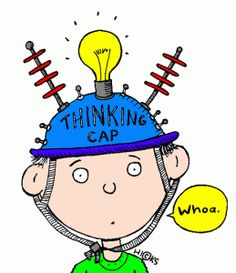
What engages and motivates student learning?

My inquiry question came to me by…
observing my practicum class early on. I noticed that many students often were disengaged and not motivated to learn or finish their work. It became my goal as an educator to create a classroom that had all of my student excited to learn and completely engaged and motivated. To me, motivated and engaged students are raising their hands to answer questions, their minds are focused and are paying attention to their teacher and classmates, are formulating questions and thinking deeper about topics, are actively involved in discussion and are eager to complete course work to the best of their ability.
What did I learn from educational research?
I learned that…
- Brain breaks or ‘3 minute motivators’ are a good way to refocus students minds when motivation and engagement is lacking
- Since we are a part of the 21st century, it’s important as educators to incorporate technology whenever applicable because this helps increase student motivation and engagement. For some students, their interest and passion lies within the realms of technology and according to research digital teaching tools are actually better for a student’s memory. Students achievement and self-efficacy increases through the use of technology.
- Classrooms that are motivated are due to motivational instructional practices from their teacher. Some instructional practices include:
- Extrinsic rewards: These can be used to reward on-task behaviour but should be used in moderation because simply relying on extrinsic rewards actually decreases intrinsic motivation.
- Autonomy and choice: Offer students several choices on how they wish to present a project, give students the opportunity to decide what the guidelines are for particular activities or create a rubric together, or simply giving students the choice on the topic of their story or animal research project will allow students to focus on things they are passionate about and interested in.
- Situational interest: The teacher uses ordinary items to teach science concepts in a hands-on manner or use Bingo as a way to teach math. Making learning fun and hands-on increases student motivation.
- Relevancy, Real World Connections: Activities are related to students home life, hobbies, and interests. Getting to know your students interests is key!
- Competition: Students love competition so bringing it into the classroom in an educational way can increase motivation and engagement. Do not have a definite ‘winner’ or ‘loser’ but rather focus on the learning that was made and the fun that took place.
- Goal Setting: Students create classroom goals together or have individual goal setting take place where students create an individual portfolio of personal goal setting, their dreams, and of their interests. Students become driven to reach their goals because they are so invested in them.
- Social and Emotional Learning should be the foundation of any classroom. Creating positive classroom community that is full of supportive relationships based around trust, respect, and understanding. Through the presence of supportive relationships, students better maintain interest in their academic pursuits and are more motivated which leads to better achievement and more positive peer relationships. Explicit teaching of social and emotional skills is needed and providing students with the tools and skills to self-regulate is very important. When students feel capable of managing their emotions and they feel safe to share their feelings in a safe environment, their motivation to learn increases.
- Fostering a growth mindset in students by praising a students effort and process rather than their intelligence increases students motivation to learn. They wanted a challenge, maintained their confidence and enjoyment despite difficulties, and they ended up performing much better on tasks. Overall, by praising a student’s process which included their effort, strategies, concentration, choices, and persistence, students were more likely to remain motivated, confident, and effective.
How did my inquiry link to my practice? My inquiry and learning were reflected in my work with students in the following ways:
- I created lessons that were hands on and engaging for my students. Ex: Seed sorting, creating human bar graphs, writing poems on paint chips, flipping a coin 100 times for probability, spinners, drawing from a bag, planting seeds, painting in Burns Bog etc.
- I gave my students a choice with their tasks. Ex: choosing what they wanted their fairytale to be about and a choice of what Burns Bog animal they wanted to research about.
- I used extrinsic rewards minimally as a management technique. Ex: cotton ball strategy
- Through my lessons I connected my students to their real world and made lessons relevant. Ex: raising money for chickens for families in Africa
- I brought social and emotional learning into the class and developed a positive classroom community and encouraged a growth mindset amongst my students. I developed positive, supportive relationships with my students. Ex: brain breaks, SEL books and discussion, focusing on praise, promoting a growth mindset through words such as, “challenge your brain” or “I can’t do it YET”, jokes to start the day, sticky note goal setting, collaboration through group work such as animal collages or carousel activities.
- I used technology for brain breaks, animal research and math games. Ex: IXL, Raz kids, GoNoodle.
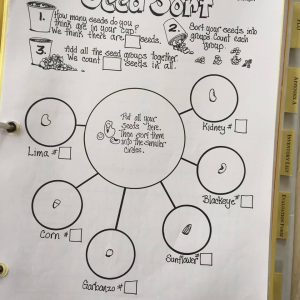
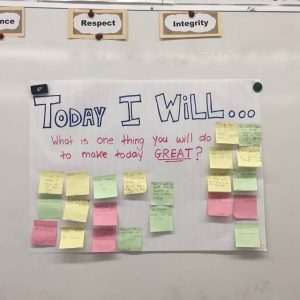
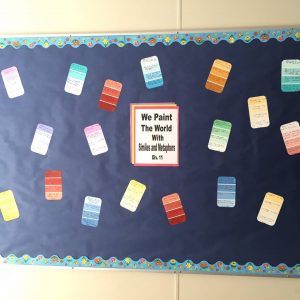
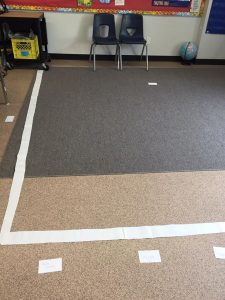
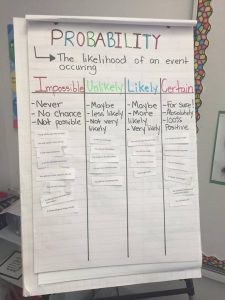
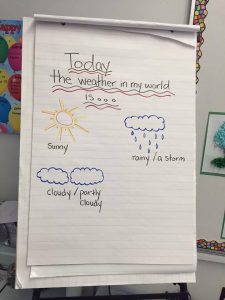
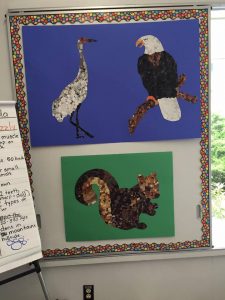

What inquiry means to me:
I initially thought inquiry was something that had an end goal; something that could be completed or come to a close. However, I have learned that inquiry is not something that is ever finished but rather a mindset and process. There is no end goal because the process is continuous; one question or wonder begins to develop into even more questions or wonders and so it’s never fully finished. The end product is unknown and has no limits because you never really know where the inquiry process will take you. Throughout inquiry we may come to know and understand a topic better, however we quickly notice how much more there still is needed to learn. The inquiry process brings with it the active creation and testing of new knowledge; It’s a process that is ongoing and continuous. To me, inquiry requires that ‘action’ piece where our investigations take us further and where we need to actually test the research and put our new understandings into practice. I think the inquiry process relates well to the teaching practice because being a teacher too is something that can never be complete; teachers always are developing and growing and it’s a continuous, never-ending journey just like the process of inquiry is.
How has your question evolved? Where might my inquiry take me next?
I began my inquiry from a simple question that arose during observing my practicum classroom early on in my teaching journey. From there, I researched the topic in further depth in order to develop knowledge and understanding on the topic. I began taking my research on my inquiry and putting it into practice. I thought it was necessary to test out what I had newly discovered in my research in order to understand my inquiry better. That’s what I did. I tested my inquiry out during my practicum and then I would reflect on it afterwards writing down what strategies worked and what didn’t work. As I progressed through my inquiry more questions began to arise.
I think my inquiry will take me further into this topic of student motivation and engagement. As of right now my question is very surface level and I would like to dig deeper into it.
Some questions to think about…
- As an educator, what can I do to reach that one student who will never be motivated or engaged?
- How do I handle behavioral problems that prevent students from being motivated?
- How can I reach students of all levels and provide support to everyone?
- What do I do when I have exhausted all other options but my students are still not focused or motivated to learn?
- How do I motivate students who have anxiety?
- How do I motivate students who don’t have the necessary skills to self-regulate?
- How do I motivate students who just don’t “get it”?
- How do I further create a growth mindset in my students?
I have learned that student motivation is not always something you can accomplish overnight; some students will never fully be engaged or motivated in the classroom. I think that as educators no matter how many instructional strategies we bring to our lessons to try to motivate our students, sometimes there is more going on with particular students that prevents them from being fully motivated.
I feel like I have scratched the surface of student motivation and need to learn more!!
